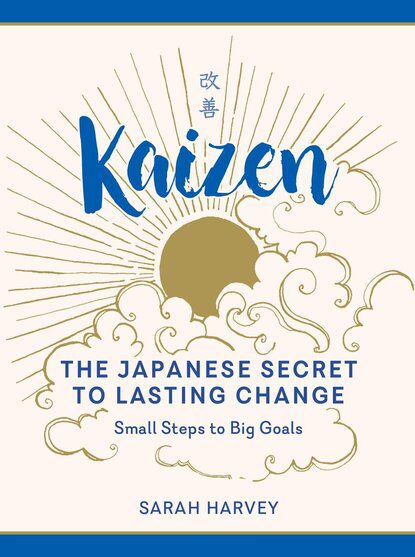After living in Japan for six months and noticing differences in her own behavior, Sarah became fascinated by how small details and incremental change were given more emphasis in Japanese daily life. In Kaizen: The Japanese Secret to Lasting Change―Small Steps to Big Goals, author Sarah Harvey shows how to apply kaizen to health, relationships, money, career, hobbies, and home—and how to tailor it to your personality.
The Kaizen philosophy: you can change your life by making lots of small steps.
Favorite Take-Aways: Kaizen: The Japanese Secret to Lasting Change―Small Steps to Big Goals by Sarah Harvey
Kaizen
Roughly translating from Japanese into ‘good change’ or ‘improvement’, the philosophy of Kaizen isn’t about change for change’s sake, but about identifying particular goals – both short-term and long-term – and then making small, manageable steps to achieve those goals. Rather than forcing us to make big dramatic changes, the method emphasizes doing things incrementally.
Kaizen uses the psychological teaching around why we find it hard to give up bad habits and stick to new challenges and offers a clear structural framework for going about change. It is most commonly known as a business methodology, but it has clear benefits for your own personal development too. It can transform the way that you feel about yourself, your goals, and your environment.
The Method
“The emphasis in Kaizen is always on doing things in small stages and treating the idea of change as an ongoing process rather than a quick-fix ‘to-do list’.”
The method will show you how to interrogate your existing habits, think about long-term goals, and then formulate a plan to start gradually making small improvements towards those goals. In the process, you will overhaul your mindset and attitude towards change. The most important thing to ensure you stay motivated is that the small changes shouldn’t feel too scary or impact upon your existing routine too much.
Continuous Improvement
Kaizen is useful for anybody wishing to change their routine. Rather than making any scary leaps into the dark, it is about stepping back and analysing your current habits, deciding what you could improve in your existing life, or thinking of new challenges you could start, then putting into place a plan to change in very small incremental stages. You will hardly even notice the difference to your routine.
With many little strokes a large tree is felled – Japanese proverb
Yokoten
Change is infectious and when success is achieved in one area, you are encouraged to apply the same techniques to another area of your life. This is referred to as yokoten or ‘horizontal deployment’, i.e. copying what works in one area to see if it works in another.
The philosophy of Kaizen is just as easy to apply to individual change as to change in a business; it is about setting long-term, medium-term and short-term goals, then thinking of small, incremental adjustments you can make to work towards these goals.
Do a ‘brain dump
If your brain is still whirring, another idea is to get a piece of paper and write out a ‘brain dump’ of everything that is on your mind from that day. It doesn’t have to be anything coherent or fully formed – just write out everything that is troubling you. This can also be a really useful exercise if you wake up in the middle of the night and are unable to go back to sleep.
Read a good book.
Just six minutes of reading before bed has been shown to reduce stress levels by two-thirds and promote good sleep. Choose a couple of nights of the week where you read before bed rather than look at a screen and see if it makes a difference.
Get out of bed five minutes earlier.
Try setting your alarm just five minutes earlier and see if it makes a change to how rushed you feel getting out of the door. If this works, try extending this further by five-minute increments each week. Just having a bit more time to get your belongings together can have a huge impact.
Your home should be a sanctuary from the outside world, not another source of stress!
Focus your attention on improving just one room and see the effect it has on your mental state and how you feel about your home. It may spur you on to want to tackle more rooms in the house. And if you live with others, don’t take all of the burden on yourself; involve your partner, your children and your friends. A stress-free home will benefit them as much as you.
Learn to say ‘no’ and set boundaries.
Part of practising self-compassion is not over-stretching yourself by doing things that you don’t want to do. Do you find that you are overwhelmed with trying to see everybody and fit everything in? Try to designate at least one or two nights per week for vegging out, doing your washing and cooking something healthy. Having more control over your own schedule and setting boundaries can feel wondrously liberating.
HOW TO STICK TO YOUR HOBBY
Start off very small.
Remembering the Kaizen approach and introducing a new activity into your routine with the least amount of disruption will mean you are more likely to stick to it. It can help to peg the activity to something you already do.
Start knitting while you watch the evening news every day, or use the ten minutes waiting for your morning coffee to brew to write one hundred words of your novel. When you get home from work, dedicate ten minutes to practising the piano before you do anything else.
Commit to spending time on your hobby.
Rather than trying to fit in your new activity when you have a small break from all of your other commitments, allocate some set time to your new hobby. Fill out the time in your calendar and set a reminder so that you definitely don’t plan anything else in its place.
Commit to a writing challenge.
Rather than sitting at your computer with a blank page in front of you, trying to magically be blessed with inspiration, try to do a small writing challenge each day instead. This can be the springboard for a bigger writing project and will get you in the habit of putting words down on the page. There are lots of podcasts and blogs dedicated to writing challenges.
Stumbling Blocks
Kaizen is a lifelong commitment to change, so there may be times when your motivation wavers or when you fall on hard times (unless you’re the luckiest person in the world). Nobody is perfect, and the idea isn’t to achieve complete perfection. It’s about approaching life as an exciting journey and opportunity for improvement. Bringing it back to Toyota’s car production line where this all started, it is about developing new ideas and practices while also polishing and refining your existing methods. There will be inevitable stumbling blocks along the way, but there are some methods to keep in mind to make sure you continue with Kaizen.
Difficult times can teach you a lot about yourself.
Although suffering a job loss, a relationship breakdown or a bereavement can be utterly devastating and make you feel like the rug has been completely pulled out from underneath you, they can also be the times when you learn a lot about yourself and your resilience. Be proud of yourself for making it through the day and what you have achieved, however small.
The Japanese and Chinese alphabets don’t have a single symbol for the word ‘crisis’. Instead, it is an amalgamation of the two symbols for ‘danger’ and ‘good opportunity’. It is hard to see the wood through the trees when you are having a hard time, but remembering that good things can come out of adversity can be helpful.
First Kaizen step: if you’re having a tough time, keep a record of one small thing that you have achieved each day, then look back on this when things are feeling better and congratulate yourself on your resilience and for getting through.
CHANGE FOR GOOD
Kaizen is not one-size-fits-all; one person’s experience of it will be entirely different from another’s. The important thing is to listen to your mind and body, then create good habits that work for you and let go of the ones that aren’t doing you any favors. Making small improvements in one area will then inspire you with the confidence to go out and achieve improvement in another.
The emphasis is on continuous improvement, so you should always be thinking about ways you can be tweaking your routine or simplifying your life. Staying mindful of your feelings and behaviors will mean that you will be more aware of when you need to take a step back or if you need a new challenge to get you out of a rut.
All the Best in your quest to get Better. Don’t Settle: Live with Passion.



1 Comment
Pingback: 100 Books Reading Challenge 2021 – Lanre Dahunsi